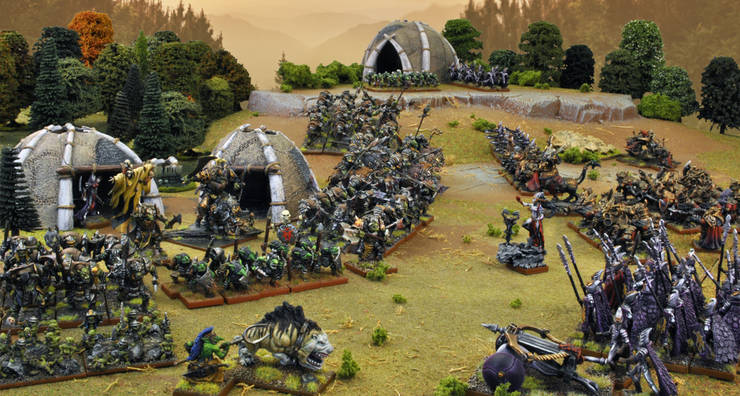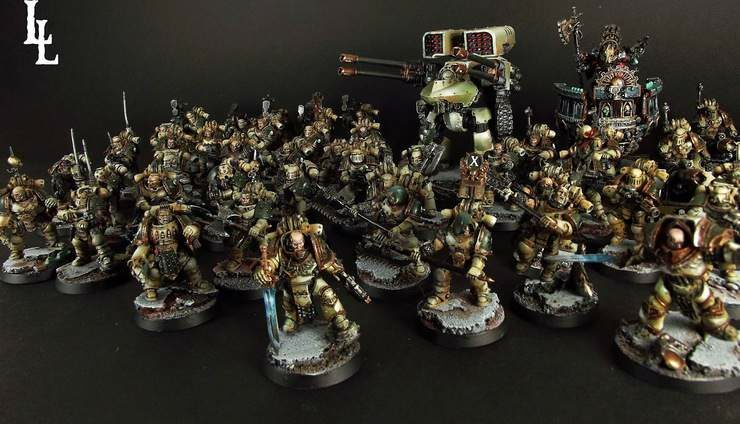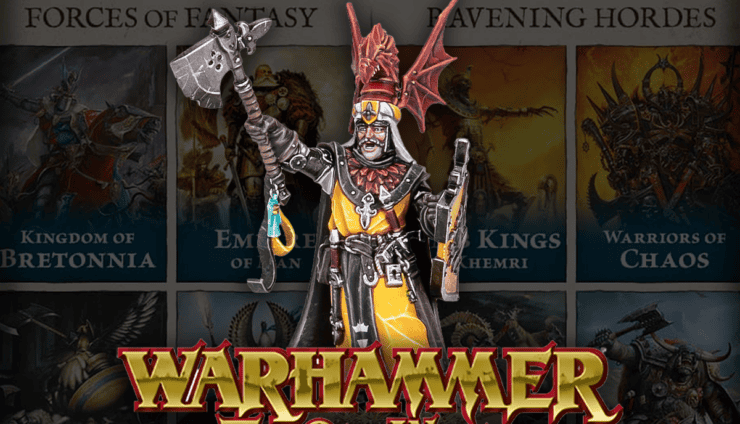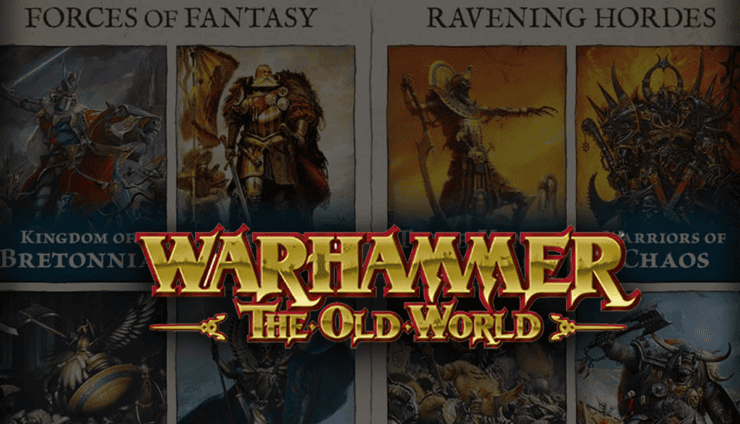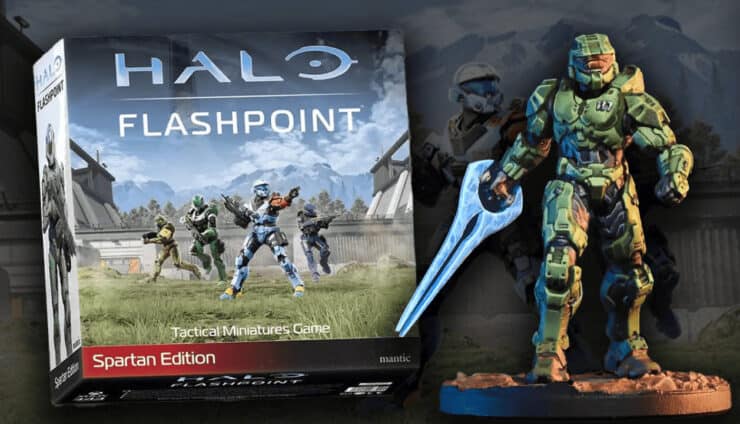Longing for a game of massed Fantasy Battles still? Grab your blocks of troops and come see how to you army stacks up in Kings of War 2.0!
Via Mantic
Kings of War 2.0
For part two of the new player’s guide, we shall take a brief look at each of the armies you can play in the game. All the core lists in the Kings of War rulebook have been through an extensive
Elves
How do they play?
The elf army is an Elite one (and it’s no surprise most units have the Elite special rule!). The basic elf statline is above the norm and the average unit will be able to go toe-to-toe with most enemy units. They can field a formidable bowline as well as a solid defence of spears. They have some excellent hitting power in the shape of their cavalry and flying options. The downside is that they are expensive and a typical elf army will have less units on the table than their opponents.
What’s in the army?
Elven scouts, bowmen and spear units form the army core. Stormwind heavy and Drakon flying cavalry options. Palace Guard are hard-hitting combat specialists and you have access to Sylvan Kin, Forest Shamblers and Treemen too if you want an arboreal flavour. There are good hero options with the Mage Queen providing solid magic support while the lord on dragon provides for a lethal, if expensive, punch to the army.
Dwarfs
How do they play?
The dwarf army is typically stubborn and solid, as is their nature. Masters of engineering, they have a plethora of black-powder weaponry with which to batter their enemies from range (or in the case of the flamebelcher, close up!). While the core of the army is slow moving, they can surprise their opponents by unleashing the fast moving cavalry that nobody expects…
What’s in the army?
A solid core of one and two handed hammer units can be bolstered with spear wielding Bulwarkers. The Ironwatch can cover the slow advance or sturdy defensive line with crossbows and rifles while the cannon and flame throwers unleash their destruction from the rear. The last thing many an opponent has seen is the glowing eyes of the earth elementals or the lethal claws and frenzied assault of the berserker brock riders. That’s right: mad dwarfs riding angry badgers!
Kingdoms of Men
How do they play?
The KoM army is one of the most versatile in the game, in terms of the units available and the play-styles and themes it can fit into. Many people use the list to model historical armies as well as fantasy ones and one or two tournaments have seen Roman armies gracing the table against unlikely fantasy opponents! The army has a good mix of ranged, foot and cavalry options backed up with artillery support and great hero choices. As with most games, the human statline is an average one.
What’s in the army?
The backbone of the army comes from good solid blocks of foot troops sporting spears, pole-arms, pikes, swords and shields. Ranged options are bows, crossbows or arquebuses. There are a number of war engines to choose from and cavalry options including the truly fearsome knight horde. Heroes can be simple champions on foot to wizards or generals on flying beasts.
Undead
How do they play?
The undead are a surprising mix of unit types; some the traditional shambling hordes and others an unexpected, fast hitting and very nimble but important part of the list. The options available mean that whether you choose a slow moving mass, a lightning fast host or a balanced mix, you opponent will know they are in for a real fight. Tricks up the army’s sleeve include the ability to recover damage in melee and for the Necromancers and dark magic users to pull off devious charges using the Surge spell. The slow moving units with the Shambling rule compensate by ignoring wavering results – they are either destroyed or keep going, there’s nothing in between.
What’s in the army?
The classic skeleton, zombie and ghoul units are all present as well as powerful mummies and wights. Fast options are ethereal wraiths, the formidable werewolf units and two cavalry options. Ranged firepower is limited but most armies will field the trust balefire catapult. Vampires, Revenant Kings and Necromancers are all hero choices.
Orcs
How do they play?
Often described as the “glass hammer” army, orcs hit like a ton of bricks but their lower than average Nerve values means units are vulnerable. No matter, there are usually plenty more following in after the carnage wrought from the first wave! Orcs are combat brutes, typically having an excellent Me score and Crushing Strength. They have minimal ranged attacks though and no war engines. Orcs don’t shoot stuff if they can chase it down – which is far more fun and satisfying.
What’s in the army?
Lots and lots of Axes. And then there are the axes. They come in all shapes and sizes, Ax, Greatax, Morax (can you guess what this unit has more of!?). Lumbering alongside the Ax units are giants and mobs of trolls while pesky, vicious packs of orclings get under the feet of everyone. Out ahead, the weedy skulks offer the only ranged option for the army while the Gore Riders and chariots bide their time, waiting for the optimal moment to charge. Fight Wagons are a fast moving Morax delivery system designed to carry the greenskins into the heart of the enemy, and spurring the whole army on are the Krudgers, the orc bosses riding their awesome and terrifying Slashers.
Goblins
How do they play?
Goblins are the eponymous and classic horde army. “The goblin horde” can refer to the entire army and also the typical unit size players will field. What goblins lack in strength and bravery, they more than make up for in sheer numbers. That’s not to say they do not lack a bite however. Giants and trolls are often lured into joining the tide of goblin warriors while fleabags and mawbeats are goaded into fighting or being ridden into battle. A goblin player is expecting numbers to win them the day (with the odd rock chucked in from a safe distance for good measure).
What’s in the army?
The usual goblin rabble armed with a variety of pointy weapons form the heart of any army in large blocks of sneaky, skittish warriors. Ponderous but solid trolls and giants make their way between the ranks (probably unaware of what they trample underfoot) while down the flanks, the lightning fast fleabag riders and mawbeast packs rush forwards to harass the enemy and throw them off balance. The goblins have access to some crafty ear engines like the short range war-trombone and the aptly named Mincer. Goblins don’t have too many hero options (possibly reflecting the fact that not many are brave enough to be considered heroes!) but they are a cheap and useful presence in the army.
Abyssal Dwarfs
How do they play?
The Abyssal Dwarfs are the wicked and malevolent take on their dwarf cousins. The core units are comparable with the dwarfs and are as slow moving, but players have access to the winged nuisances that are gargoyles and also fast moving cavalry in the form of Abyssal Halfbreeds (part dwarf, part…thing). The army has a different take on black-powder weaponry, favouring mortars and blast weaponry over more direct cannon fire. The impressive golems can form an implacable line to provide solidity and stopping power. Units in the army are typically Vicious like the Twilight Kin and a smattering of units can Regenerate.
What’s in the army?
Blacksouls, Immortal Guard and Decimators shape the army core and make for a typically stubborn dwarvern battle line. The Decimators are deadly at short range with their Thunderpipes if they can get into position. Abyssal Berserkers and Slave Orc units are slightly faster units that can be a first wave or counter attacking element. Lesser Obsidian Golems, Gargoyles and Abyssal Halfbreeds give the player options on how the army should behave and be themed and the army general is spoilt for choice with three different types of mortar and a flame-thrower to choose from. Heroes are pretty decent with some good hitting power, flying options and magic too.
Ogres
How do they play?
The army has a low model count and often has fewer units on the table than their opponent. To compensate however, Red Goblin units are available for bulking out the army with smaller rabble but also giving the army excellent speed and a dastardly weapon in the less-than-subtle Blaster. While some ogres carry heavy ranged weapons, as a species they excel at combat, even more so than the orcs. A charge from an ogre regiment (or Legion!) is likely to result in a bloody mess for their opponents. Chariots are an option for both ogre warriors and heroes, adding to their punch. The ogre army is difficult to master for new players but once you have learnt to manage its strengths and weaknesses, it can be a formidable proposition to face.
What’s in the army?
Ogre warriors will be the mainstay of the army, supported by units with either heavy crossbows or blunderbusses. Siege Breakers can make a solid defensive block with a lethal punch. Chariot units provide some speed and an extra crunch but the most manoeuvrable units are the Red Goblin Scouts on fleabags. Some additional, weak ranged attacks are available from red goblins armed with bows and ogre warlocks are often accompanied by their followers, the Berserker Braves. The red goblin Blaster is about as blunt an instrument of destruction as you can find and the army is commanded by fierce ogre captains and warlords.
Basileans
How do they play?
Like the standard human army, the Basilean list is very flexible and armies can be constructed with very different themes and purpose. The army is excellent at healing and removing damage inflicted on it and has some very fast and hard hitting units to pick from. The army is not very impressive in terms of ranged combat however, preferring to deliver the Basilean message to non-believers face-to-face. Statlines are middling as you’d expect for humans, but they are somewhat braver than their Kingdoms of Men counterparts.
What’s in the army?
Blocks of Men-at-arms are accompanied by paladin knights on foot or on mounted warhorses. The Basilean Sisterhood can be represented on foot or as light cavalry on their speedy panthers and chariots. Flying high above the army, the angelic and awesome Elohi are ready to sweep down and purge the unworthy from the world. The majestic phoenix is a nice monster choice and the hero options are powerful with High Paladins, War-wizards and Ur-Elohi.
Forces of Nature
How do they play?
This is a very varied army and can have quite different play styles depending on the units you chose. You can have a fast army of trees that launch themselves forward before the game begins, a plodding army of elementals, or you focus on infantry and cavalry options. Interestingly it doesn’t have big combat characters – instead the focus is on spell-casting druids which have the Surge spell and like the Undead, can use it on their shambling minions.
What’s in the army?
Starting with tough Elementals, (fire, air, earth and water) they share Hunter of the Wild, Forest Shamblers and Treemen with the elf army, but they are better here with the powerful druids to back them up. There are fast Unicorn’s, Beasts of Nature and Centaurs who move fast and hit hard. The mix continues with Naiads, Sylphs and Salamanders: a truly varied army of the four elements, fairy creatures and the power of nature, it allows the imagination to run… wild.
Legions of the Abyss
How do they play?
This is a horde army which allows large numbers of Abyssals out of the pit onto the battlefield! The army can take plenty of punishment and keep going due to army wide Fury rule. Your units may waver in combat but their retribution can be immediate! The army contains many fast units with a focus on melee combat, supported by flamebolt casting units and powerful champions and monsters.
What’s in the army?
There are the leering legions of lesser abyssals, Larvae, Succubi and other creepy demonic monstrosities. Winged twisted gargoyles flap above in the skies while huge ogre-like demons known as Molochs march amongst the throng. Abyssal horsemen thunder towards the enemy as snarling hellhounds menace the enemy flanks. Efreets, Temptresses and Archfiends lead the army to war.
Are any more armies coming?
Yes! We are in the process of developing a number of new army lists to supplement the core ones that cover some classic races that we’ve not yet fully explored. Each army will be getting new background so players have an idea of how they fit into the Mantic world and Kings of War game. These armies are going through the same public playtesting as the core lists did to make sure everything is a balanced as possible and the community get to feedback ideas and suggestions to help in the development process. These armies, once ready will be released as a supplement book.
The armies currently being developed are (actual names might change):
- Ratkin – A race originally created by the Abyssal Dwarfs (Evil)
- The League of Rhordia – an alliance of human city states and the halfling shires (Neutral)
- The Herd – satyrs, centaurs, minotaurs, owlbears and other beastmen. (Neutral)
- The Shattered Clans (Humans) (Evil)
- Empire of Dust (Mostly Skeletons) (Evil)
- Reptilians (two different lizard-based races) (Good)
- Name TBC – fluff still to be done (Humans: expect knights, peasants and elements of nature.) (Good)
- SUPER SECRET
- SUPER SECRET
Any more!?
Yes – The core Twilight Kin (Evil, dark elves) army will get a temporary list (still official for tournaments) because the model range and background is going to get an overhaul. This is likely to be done alongside two more new core armies: the Ophidians (Neutral) and an alliance of races in the north (Good).
